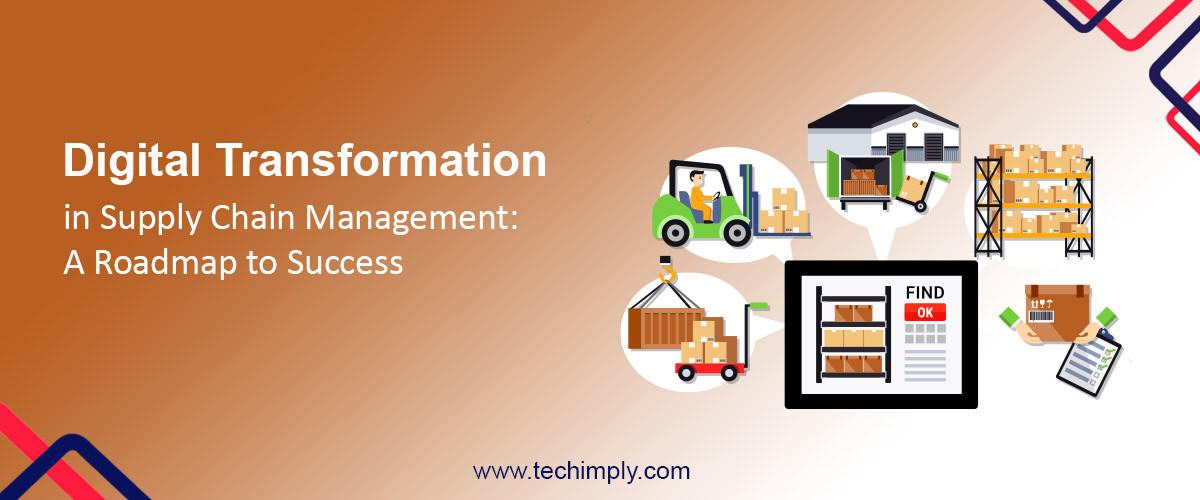Digital transformation in supply chain management refers to the integration of technology and digital solutions into the traditional supply chain management processes. The goal is to streamline operations, optimize performance, and increase efficiency by leveraging automation, real-time data, and analytics.
Supply chain management digital transformation involves the adoption of various technologies such as blockchain, the Internet of things (IoT), artificial intelligence software (AI), cloud computing, and robotics. These technologies provide end-to-end visibility and real-time monitoring, allowing businesses to make informed decisions, reduce operational costs, and improve the customer experience.
The use of IoT devices and sensors provides businesses with data on supply chain performance, allowing them to track inventory levels and shipments, monitor environmental conditions, and optimize logistics. AI-based systems can analyze data and provide predictive analytics to help businesses forecast demand and optimize inventory levels.
Blockchain technology provides secure and transparent record-keeping, allowing businesses to track products and shipments from the manufacturer to the end customer. This technology reduces the risk of fraud and errors, and it also provides real-time tracking and tracing capabilities.
Introduction
Supply chain management digital transformation also involves the adoption of cloud computing. Cloud-based solutions provide centralized data storage, collaboration, and communication, making it easier for businesses to manage their supply chains. With cloud-based solutions, businesses can share data with partners and suppliers, which leads to increased efficiency and improved communication.
The rise of technology has brought significant changes to the world of supply chain management. With the increasing demand for faster, more efficient processes, businesses are turning towards digital transformation solutions to improve their operations. In this article, we will explore the roadmap for digital transformation in supply chain management and how it can lead to success.
1. Identify the Current State Of Your Supply Chain Management: The first step in digital transformation is to assess your current supply chain management system. Identify areas that require improvement, such as inventory management, logistics, and transportation.
2. Define Your Digital Strategy: Once you have identified the areas that need improvement, you can start developing a digital strategy that aligns with your business objectives. Determine what technology you need to adopt, such as automation, analytics, and cloud computing.
3. Choose The Right Technology: The next step is to choose the right technology that can support your digital strategy. Consider the cost, ease of integration, and impact on your operations when selecting technology.
4. Implement The Technology: After selecting the technology, the next step is to implement it. Develop a plan that outlines how you will integrate the technology into your current system. Ensure that your team is trained on how to use the technology effectively.
5. Monitor And Evaluate: It is important to continuously monitor and evaluate the success of your digital transformation. Regularly review your processes to identify areas for improvement and determine how technology can help optimize them further.
Pros Of Digital Transformation In Supply Chain Management
Digital transformation in supply chain management can bring numerous benefits to businesses. Here are some of the pros of implementing digital transformation in supply chain management:
1. Enhanced Visibility: Digital transformation can improve visibility across the supply chain, from suppliers to customers. Real-time tracking of inventory and shipments can help businesses make data-driven decisions and respond quickly to changes in demand.
2. Cost Savings: Digital transformation can help reduce costs by optimizing inventory levels, reducing waste, and improving transportation routes. Automation can also help reduce labour costs and increase productivity.
3. Improved Customer Experience: With digital transformation, businesses can provide a better customer experience by offering real-time tracking and notifications, faster delivery times, and personalized services.
4. Increased Agility: Digital transformation can help businesses respond quickly to changes in the market or supply chain disruptions. Real-time data can help identify risks and opportunities, allowing businesses to make agile decisions.
5. Better Collaboration: Digital transformation can facilitate better collaboration among suppliers, partners, and customers. Cloud-based platforms can provide a centralized hub for communication and data sharing, leading to better collaboration and more efficient supply chain management.
Overall, digital transformation in supply chain management can help businesses gain a competitive advantage by improving efficiency, reducing costs, and enhancing customer experience.
6. Agility and Flexibility in Business: In the ever-evolving landscape of business, agility and flexibility have become indispensable attributes for organizations striving to thrive amid uncertainty and rapid change. Agility refers to an organization's ability to swiftly respond to market shifts, adapt to new circumstances, and embrace innovation. Flexibility, on the other hand, involves the capacity to adjust strategies, operations, and structures in response to dynamic external factors.
The interconnected nature of today's global markets, coupled with technological advancements, demands that businesses be nimble and responsive. Agile organizations can pivot quickly, seize emerging opportunities, and navigate challenges with resilience. This adaptability extends beyond mere survival; it positions businesses to gain a competitive advantage by staying ahead of trends and customer expectations.
Flexibility enables organizations to tailor their approaches to specific situations, accommodating diverse market demands and customer preferences. Whether adjusting production processes, modifying product offerings, or reconfiguring supply chains, flexible businesses can align their operations with the evolving needs of the market.
Embracing agility and flexibility requires a cultural shift, where innovation is encouraged, and decision-making is decentralized. It involves investing in technologies that facilitate quick responses and fostering a mindset that embraces change as an opportunity for growth.
In conclusion, as businesses confront an era of unprecedented change, those that prioritize agility and flexibility are better positioned to not only weather uncertainties but to flourish in dynamic environments. These attributes empower organizations to proactively shape their destinies, making them more resilient, competitive, and capable of sustaining success in an unpredictable world.
What Is The Future Of Supply Chain Management: Embracing Digital Transformation
The future of supply chain management lies in embracing digital transformation. As technology continues to evolve, businesses must adapt to remain competitive. Here are some of the ways that digital transformation will shape the future of supply chain management:
1. Increased Automation: Automation will continue to play a significant role in supply chain management. Robotics, drones, and autonomous vehicles will help streamline processes and reduce labour costs.
2. Internet Of Things (IoT): The IoT will provide real-time visibility across the supply chain, allowing businesses to track inventory and shipments in real time. Sensors and RFID technology will provide data on location, temperature, and other conditions, helping to optimize processes.
3. Artificial Intelligence (AI): AI will help businesses make more informed decisions by analyzing large amounts of data. Predictive analytics will help businesses forecast demand and optimize inventory levels, while machine learning will help identify patterns and anomalies in the supply chain.
4. Blockchain: Blockchain technology will help improve transparency and traceability across the supply chain. It will provide a secure and decentralized platform for sharing data, reducing the risk of fraud and errors.
5. Cloud-Based Platforms: Cloud-based platforms will provide a centralized hub for collaboration and data sharing across the supply chain. They will help improve communication and streamline processes, leading to increased efficiency and cost savings.
6. 3D Printing: 3D printing will help businesses reduce lead times and inventory costs by allowing on-demand production. This technology will help enable customization and mass personalization while reducing the need for traditional supply chain logistics warehouses.
The future of supply chain management lies in embracing digital transformation. By leveraging technology such as automation, IoT, AI, blockchain, cloud-based platforms, and 3D printing software, businesses can improve efficiency, reduce costs, and enhance the customer experience. Companies that embrace digital transformation in supply chain management will be better positioned to succeed in the highly competitive global marketplace.
Conclusion:
Technology plays a crucial role in the transformation of supply chain management. By leveraging digital transformation, businesses can improve efficiency, reduce costs, and enhance the customer experience. Automation, analytics, cloud computing, IoT, and other technological advancements have revolutionized the way businesses manage their supply chains, and the trend is expected to continue.
However, it's important to note that technology alone cannot guarantee success. The successful transformation of supply chain management requires a well-defined strategy, collaboration among stakeholders, and a culture that supports innovation and continuous improvement.
Overall, technology is a key enabler of supply chain management transformation, and businesses that embrace it will be better positioned to succeed in the competitive global marketplace. By embracing digital transformation, businesses can optimize their supply chain management processes, reduce costs, and enhance customer satisfaction, leading to increased profitability and growth.




.png)

